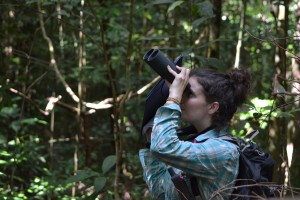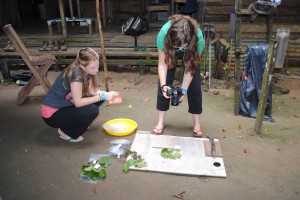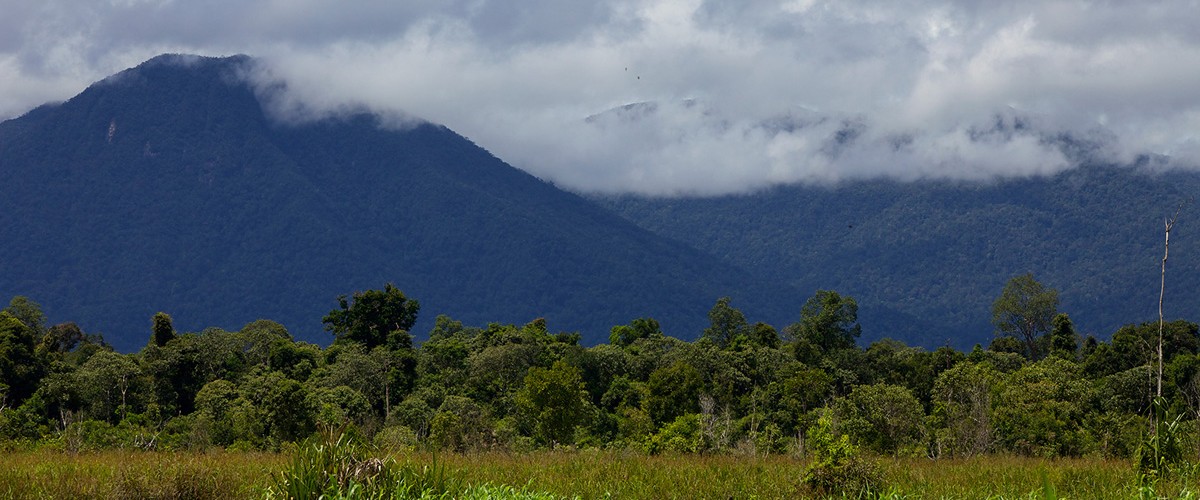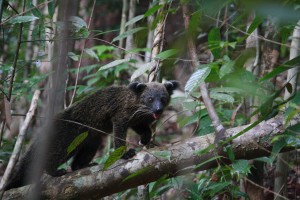By Becki Ingram, Research Volunteer
Today began the way most days here do, up bright and early at 3:30 am with my colleagues, arriving at the orangutan nest not long after. I have to say, I will not miss these early morning starts! What I will miss, however, are the beautiful creatures I have risen for every morning, followed, and studied so intensely over the past year. It is during mornings like these, while waiting for the orangutan to wake up, that I spend most of my time reflecting on my experiences here in Cabang Panti.
It seems unreal to me that soon this beautiful forest which I call home, will be but a thing of my past. My day-to-day life will return to the hustle and bustle of western life: the urban jungle. The only word I could possibly use to describe the feeling is bittersweet. I’m disappointed that I have to leave behind the gentle and soothing sounds of the cicadas, and the deafening but comforting downpour of jungle rain which sends me off to sleep almost instantly. What about the song of gibbons I wake up to every morning, or the monkeys that rise overhead as I wash in the crystal clear waters by camp? Don’t get me wrong, there have been some things about home which I have missed profusely right from the start: my loved ones, a whole host of food items, and the cold crisp British weather (to name a few). There are so many more things about this place, though, that I will miss. One in particular really plays on my mind – the sense of never feeling alone, no matter what. I find it is all too easy these days to get lost in big cities, to lose yourself and your sense of being, and to feel alone among millions of people. There has never been one point during my stay here that I have felt alone, even when my GPS stopped working 100 meters off trail while searching for an orangutan, or when I had to walk an hour through the forest to Lupus’s nest site at 4am on my own. The forest never sleeps; it fills your senses with different sounds and smells, and maybe even gifts you with the rare glimpse of a sunbear, civet cat or monitor lizard. In this sense, how could you ever feel alone?

Becki in action in the field, carefully watching the orangutans as they go about their daily activities
I came to Cabang Panti last March with very little prior knowledge about orangutans. I graduated with a degree in Geography, and although my thesis focused on macaques, I consider myself fairly new to the world of primatology. Over the past year I have seen orangutans and their day-to-day life first-hand, while examining at the same time the vast expanse of literature that aims to define them. I have found it so interesting that my experiences and sightings in Cabang Panti, have been at times, completely opposite to what the literature describes as ‘normal’. I was privileged enough to arrive just before a forest fruit masting event in the months of June and July last year. A fruit masting is where the forest trees fruit synchronously, attracting swarms of orangutans that come together to feed on the enormous array of calorie-rich foods. I found the sheer number of groups I witnessed over this period, ranging from just two individuals up to over seven, totally remarkable. The huge number of males we had coming into very close contact with each other, both flanged and un-flanged, also became a topic of huge fascination to me.
This past year has been invaluable. Due to the vast array of project tasks I have assisted with, I’ve learned more than I could have ever anticipated. Aside from the official duties, I have learned that the Neesia fruit is almost impossible to break into no matter how hardy the tool (whilst orangutans break into it using their hands and teeth), that catching urine at 4am with a handmade urine stick is very satisfying and often just as difficult, and that swimming across rivers or wading through waist high swamps to keep up with the orangutan traveling overhead are normal things in the life of a researcher. I have also been privileged enough to work with visiting PhD student Caitlin O’Connell, from whom I learned a great deal on sociality and parasitology. Above all, I have learned that life out here is no organized expedition. Things don’t always go as planned, visas sometimes get postponed and accidents happen. As a result of a combination of these things, I had the opportunity to co-manage the research site between July and September in an interim period between managers. I am hugely grateful for this experience; it opened my eyes to the world of management and I really got to appreciate the extraordinary amount of hard work managing a project like this entails.

Previous research volunteers photograph leaf samples to add to the project”s reference collection, one of their many daily tasks
When I first arrived, I was fascinated by almost every individual we found and followed within Cabang Panti. There is one individual in particular though, that I have experienced some truly magical moments with over this past year – Walimah. She is one of the most followed adult female orangutans at the research site, and in fact, the only one that we are sure that we’ve followed since birth. After hearing endless stories about her incredibly fascinating social behavior right from my first day, I was dying to meet her and see what all the fuss was about. Alas, she disappeared off our radar for three months from April through to June. It was one sunny morning in July, when I was searching up the mountain that I was startled by a pair of orangutans crashing around not far off the trail. My heart pounding, I quickly contacted Dr. Knott’s husband, Tim Laman, and his team from National Geographic magazine and we discovered this was actually Walimah, in a consortship with unflanged male Yoda. After not seeing her for three months, and noticing abnormalities in her body, I decided to pregnancy test her. The result was positive! I have never felt intense excitement quite like that, and have never had a celebration dance quite like it either! Seven months later, and on the brink of giving birth, Walimah has been followed almost continuously and we have managed to create an impressive data and photo portfolio of almost the entirety of her pregnancy. (Note: Becki wrote this in February, and Walimah’s baby was born in early March)
Right from the start of my time here actually, I fell in love with search days. I have to admit, many days are met with disappointment – the flash of red can often turn out to be a red leaf monkey. When you hear a long call however, you know for sure that an orangutan is around. There was one day in particular when I was searching deep into the peat swamp, that I had another magical moment. It actually started without any sight or sound of an orangutan. In fact it started with a stare off with a different kind of magnificent beast. This one had black fur, a long chunky tail, whiskers, and curious eyes: a bearcat, or binturong. These animals are known for being truly elusive, and indeed I had absolutely zero expectation of having such an encounter over my time in Cabang Panti. The minutes whizzed past as I sat on the trail in pure disbelief of this animal that was flopped over the branch of a tree, legs dangling on either side, and staring at me. I hadn’t quite expected this find! An hour passed before the binturong decided to move on and elegantly disappeared through the treetops. There was no time to digest this, as I immediately heard a bellowing long call from a point just 50 or so meters from where I stood. Compass out, I scrambled my way through the thicket, battling the vegetation with every step. The long call came to a brisk end, but I trusted my compass, stopping every few steps to listen for any more sounds. The next thing I knew, I was standing directly below one of our huge flanged males, Prabu, and quickly had to dodge a falling branch. Whether that branch had hit me or not (and luckily it did not!) it would not have taken away just how amazing that morning had been.
These are only two of many fond memories I will take away with me from this place and the wonderful people I have had the privilege of sharing it with. I couldn’t sign off without saying a huge thank you to Dr. Cheryl Knott for providing me with such a life changing opportunity, in a forest I never dreamed would be so beautiful. Not to mention my wonderful managers, Jennifer Brousseau and Kat Scott, both of whom made sure I was never jobless, and always lifted my spirits even when I thought I couldn’t be any happier. Whatever the future brings, and wherever I end up, Cabang Panti will always hold a special place in my heart for providing me with the most eye-opening introduction to the world of primatology. Who knows, maybe one day I will get the chance to return to meet Walimah’s baby, and chase Prabu around the peat swamp once more.








